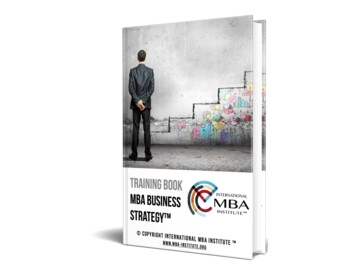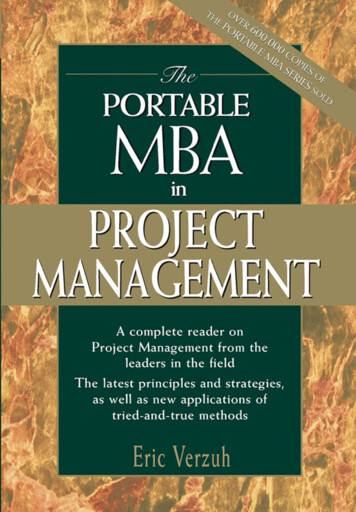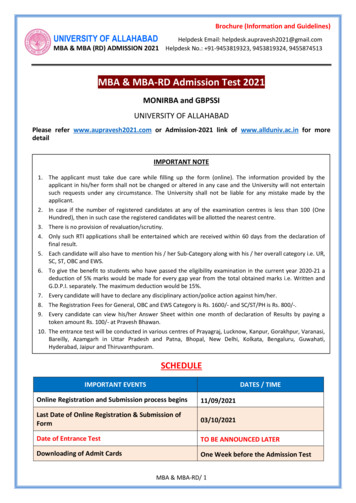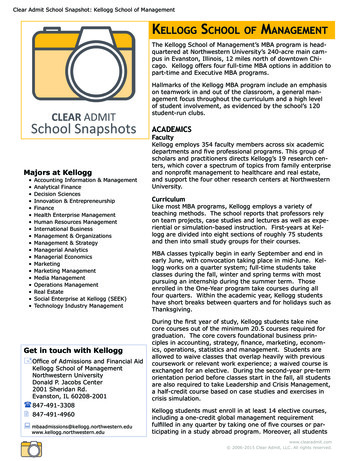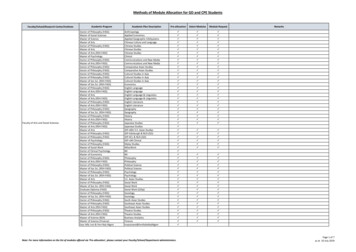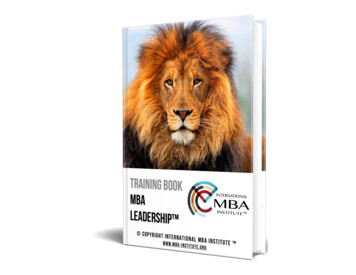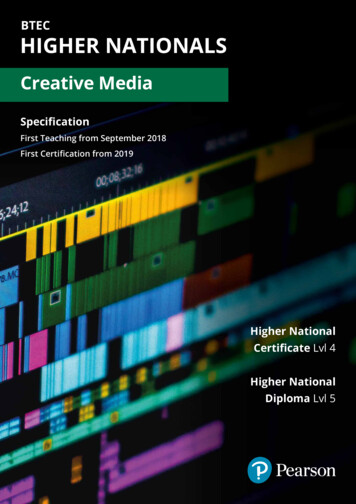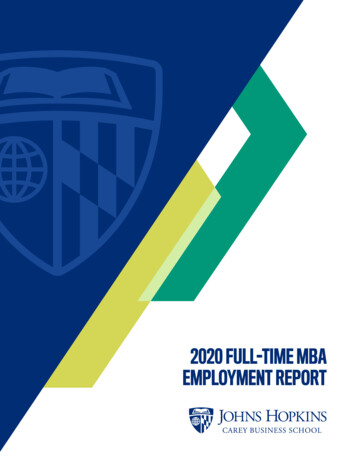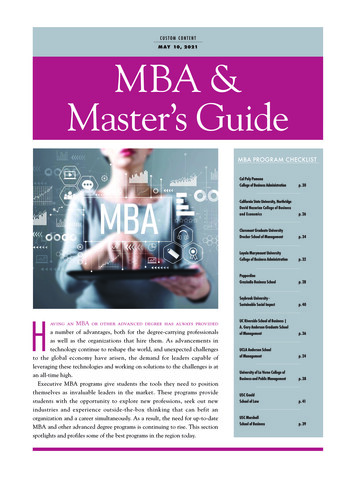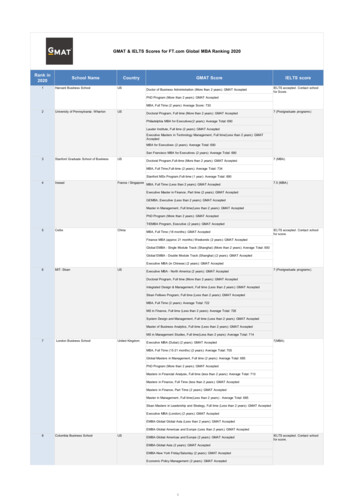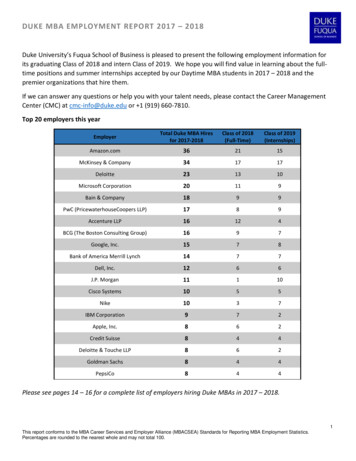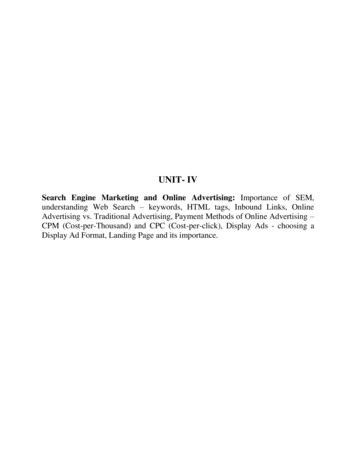
Transcription
UNIT- IVSearch Engine Marketing and Online Advertising: Importance of SEM,understanding Web Search – keywords, HTML tags, Inbound Links, OnlineAdvertising vs. Traditional Advertising, Payment Methods of Online Advertising –CPM (Cost-per-Thousand) and CPC (Cost-per-click), Display Ads - choosing aDisplay Ad Format, Landing Page and its importance.
Search Engine Marketing and Online AdvertisingSearch engine marketing is the practice of marketing a business using paid advertisements thatappear on search engine results pages (or SERPs). Advertisers bid on keywords that users ofservices such as Google and Bing might enter when looking for certain products or services,which gives the advertiser the opportunity for their ads to appear alongside results for thosesearch queries.These ads, often known by the term pay-per-click ads, come in a variety of formats. Some aresmall, text-based ads, whereas others, such as product listing ads (PLAs, also known as Shoppingads) are more visual, product-based advertisements that allow consumers to see importantinformation at-a-glance, such as price and reviews.Search engine marketing’s greatest strength is that it offers advertisers the opportunity to puttheir ads in front of motivated customers who are ready to buy at the precise moment they’reready to make a purchase. No other advertising medium can do this, which is why search enginemarketing is so effective and such an amazingly powerful way to grow your business.Importance of SEMEveryone can agree that the acceleration of online activity over the past five years has beennothing short of phenomenal. Our global society has witnessed unprecedented growth in the areaof online activity from conducting research to shopping and everything in between. This growthhas spanned not only desk-top but mobile technologies as well. So why is it that somebusinesses, or industries for that matter, may still fall behind a bit when it comes to prioritizingSEM into their overall marketing strategy? Perhaps many don’t have a solid grasp of what it isand how it can work for them, so we’d like to help with that. First, what exactly is Search EngineMarketing? It’s a term that we hear tossed around quite a bit these days, but nevertheless, it’simportant to have a good understanding of what it is.Search Engine Marketing (SEM) is the entire set of techniques and strategies used to generatemore visitors from search engines to your business or marketing website. SEM seeks to promotewebsites by increasing their visibility in search engine results pages through the use of paidsearch, contextual advertising and organic placement.Paid Search refers to the text ads that show up in search engines such as Google or Yahoo, whichare targeted to a user’s keyword search. Paid search is very targeted advertising, and whensupported with strong analytics, can be very useful in determining ROI. Paid search can also bereferred to as Search marketing, pay per click or cost-per-click advertising.Contextual Advertising refers to text ads that are the targeted to writings on the web such asblogs or news articles.
Organic Search or Search Engine Optimization are the results that come up via a generic search.In order to have your business site rank high in a search, it is important that you optimize HTMLcode, web page copy, site navigation and more. The higher your site appears in a search, themore likely consumers will click on it. So, how can SEM work for you and your business? Well,as stated above “SEM seeks to promote websites by increasing their visibility in search engineresults pages through the use of paid search, contextual advertising and organic placement.”Good SEM will literally drive business to your site, but to break it down into a few specifics,here are four ways that SEM can support your over-all marketing strategy:1.2.3.4.SEM can increase and enhance your brand awareness.SEM can sell products, services or content online.SEM can generate online leads and increase sales.SEM can provide informational and educational content.So, as you can see, SEM really should be an integral component of your overall marketingstrategy, not just an after-thought. If you’re not sure that you are optimizing your SEM, give usa call. We’ve been helping businesses increase brand awareness, generate leads and increasesales since 2000. We’d love to help your business as well.Keyword optimization (also known as keyword research) is the act of researching, analyzingand selecting the best keywords to target to drive qualified traffic from search engines to yourwebsite.Keyword search optimization is a critical step in initial stages of search engine marketing, forboth paid and organic search. If you do a bad job at selecting your target keywords, all yoursubsequent efforts will be in vain. So it’s vital to get keyword optimization right.
But optimizing keywords isn't something you do ONLY at the outset of a search marketingcampaign. Ongoing keyword optimization is necessary to keep uncovering new keywordopportunities and to expand your reach into various keyword verticals. So keyword optimizationisn’t a set it and forget it process. By continuously performing keyword analysis and expandingyour database of keywords, your site traffic, leads and sales will continue to grow.Benefits of Keyword OptimizationIn a recent survey, participants listed keyword optimization as one of the hardest tasks in searchengine marketing. Because of its difficult nature, most site owners, marketers and bloggers don'tspend enough time optimizing keywords. This is ironic since optimizing keywords is the mostimportant aspect of SEO and PPC. If you don't choose and use keywords your customers aresearching for, you won't get found. That means no traffic, no sales, no money.So to look at the big picture, you must practice search engine keyword optimization to: Drive qualified traffic to your website: To drive searchers to your site, you mustoptimize for the keywords they're searching forMeasure traffic potential: Analyzing the popularity of keywords helps you gauge thesize of a potential online market.Write effective content: By incorporating optimized keywords into your websitecontent, you can connect instantly with potential customers and address their needs.Understand user behavior: By analyzing the words that your customers use, you get anidea of their needs and how to service those needs.Where Keyword Search Optimization Comes into PlayKeyword optimization plays a major role in every aspect of Internet marketing from contentstrategy, to link building, to how you group your keywords in your AdWords ad groups, to howyour site content is organized, a.k.a your information architecture.SEO Keyword OptimizationWhen it comes to SEO, the success of your organic search efforts rests largely on how effectiveyou are at discovering, researching, analyzing and selecting the right search engine keywords foryour website. All other aspects of SEO rely on successful keyword optimization. What's more,optimizing keywords touches every aspect of your SEO marketing efforts. Title Tag: Your target keywords must be included in the title tag (and front loaded). Thisis the most important piece of content on your website, both on and off-page.Links: Keyword optimization should be integrated into your link building strategy.Internal links, inbound links, breadcrumb links, navigational links should all have yourtop optimized keywords. It's also important to track and manage your link text effortsContent strategy: If you want to rank well and connect with searchers, you need to useyour target keywords in your content. WordStream for SEO helps combine keywordresearch with content authoring (just saying.).
Images: Don't forget to optimize keywords in the pictures on your website. Targetkeywords should be used in your image alt attribute and file names, to name a few.Meta Description: There's some debate over whether or not including target keywords inyour text snippets helps rankings. But there's little doubt that having your optimizedkeywords here produces more clicks in searches, which is optimal.URL: Be sure to include keywords for SEO in file name slugs, like I've done with thispage's URL. The page is about keyword optimization, so the slug name is /keywordoptimization.Site Structure: Keyword optimization is also critical to how you structure and organizeyour site content. Not only do you need to select the right keywords, but you need togroup them hierarchically and order the corresponding pages on your websiteaccordingly.PPC Keyword OptimizationBut optimized keywords aren't just for organic search marketing. There's tremendous value inoptimizing your PPC keywords. To be effective with your pay-per-click campaigns, you mustspeak the searcher's language. The more keywords you select that your customers are searchingfor, the more traffic you'll drive to your website, the more consumers you'll convert to customers. Creating a keyword list: Determining which keywords to target and bid on is thelinchpin for all your PPC marketing strategies. Different keywords have different demandand traffic potential.Grouping and segmenting: Keyword optimization helps organize your keywords intotight groups that are semantically related.Improved relevancy: The key to a higher click-through rate is being relevant to thesearcher's query. Higher CTR leads to better Quality Score. Optimized keywords areinstrumental in being relevant.Crafting ad text: To coax searchers into clicking on your ads, you need to integrate yourkeywords into your PPC ad text.Landing page optimization: Once a user lands on your page, your message must matchthe offer. So the optimized keywords that were present in your ad text, must be present onyour landing pages.You can take your PPC optimization further by evaluating your AdWords account with theAdWords Performance Grader, which grades your campaigns on important factors like ad textand long-tail keyword optimization.Social Media Keyword OptimizationDetermining which keywords to target and how to incorporate them into your messaging is alsoa big factor in social media marketing. This guide to KeywordResearch for Social Mediais agood resource for determining which keywords your audience is using and covers everythingfrom how to conduct keyword research for YouTube to researching keywords for Facebook.
Traditional vs. Online MarketingThe Real Value of Your Online Marketing EffortsWhen it comes to marketing—is digital really the new traditional? What do you think?That’s a long-standing debate that has marketers on both fronts defending the merits of each.
1. Pay-Per-Click (PPC)Pay-per-click (PPC) has been an effective paid advertising strategy for many years now, and thistrend doesn’t show any signs of slowing down anytime soon. In fact, paid search marketing nowaccounts for about 65% of “clicks," compared to just 35% being generated organically. Combinethis with the fact that PPC visitors are 50% more likely to make a purchase than organic visitors,and it’s suddenly quite clear why pay-per-click advertising can be an effective way to spend yourmarketing budget.2. Social Media AdsThe power of posting ads on social media has grown exponentially in the past few years,especially as social media sites like Facebook have begun offering users more paid marketingoptions than ever before. For example, Facebook’s relatively new “Audience Insights" featuremakes it easy for marketers to hone in on their target demographic, learn more about theirpreferences, and create great ad content.Advertising on social media is one of the easiest and most effective ways to ensure your messagereaches your target audience—and social media users are in agreement. In fact, 57% ofMillennials surveyed agreed that the ads they’ve seen on social media are more relevant to themthan ever before.3. Influencer MarketingIn recent years, influencer marketing has become an extremely effective source of paidadvertising. Specifically, influencer marketing refers to working directly with a well-knownindustry name (such as a celebrity) to encourage your target audience to choose yourcompany/brand. This strategy can be especially effective on social media and is a greatalternative to paid ads, which some customers are now blocking. And in 2016, the use ofinfluencer marketing even surpassed print marketing for the first time4. Banner AdsBanner ads—those small, rectangular ads you often run into along the top or side bar of a webpage—have been around for decades. Today, it is not uncommon to see banner ads displayed notjust on desktop devices, but on mobile devices (such as smartphones and tablets) as well.And despite many new paid online advertising strategies emerging in recent years, however,banner ads continue to be one of the most effective. In fact, in 2018 alone, it is estimated thatbusinesses will spend nearly 25 million annually on desktop and mobile banner advertisingcombined.
5. Ad RetargetingOne relatively new paid advertising opportunity that is picking up a lot of steam is known as adretargeting or remarketing. This strategy utilizes cookies on a website to anonymously trackusers’ activities as they move across the Web. This data can then be used to ensure that users seeonly ads that are most relevant to them. Generally, remarketing or retargeting tends to be themost effective among websites that already have high traffic levels (ideally 5,000 visitors ormore each month). If this applies to your site, then it may be time to consider implementing thispaid strategy for yourself.Landing Page and its importanceAs you dive into the world of digital marketing, you’ll likely encounter a whole new vocabularyand set of concepts. If you haven’t already, you’re bound to have questions about how landingpages fit into your digital marketing strategy. Developing a landing page sounds like a simpletask, and it can be, but we want to stress that landing pages are vitally important to leadconversion.What is a Landing Page?A landing page is any web page that a consumer can land on, but in the marketing realm, it’susually a standalone page, distinct from your homepage or any other page, that serves a singleand focused purpose. A landing page is a follow up to any promises that you’ve made in yourcontent. Essentially, it’s the next step toward a visitor becoming a customer. Your landing page
lets you make a trade, some sort of special offer, piece of information or a deal, in return forproviding contact information.Landing pages can be click through, leading to another page such as your e-commerce site, orlead generation based. Lead generation landing pages typically offer items like an eBook, freetrial, contest entry or webinar registration in return for the submission of contact information. Agood landing page will do its job by convincing a potential customer that it’s worth it to providepersonal details in return in exchange for whatever you have to offer. Landing pages can befound through a general search or via your company website, increasing the likelihood that apotential customer will end up there.There’s no need to have just one landing page, or even just one landing page at a time. In fact,experts in the marketing would probably suggest that you maintain multiple landing pages,targeted toward segmented customer populations.Why Use Landing Pages?You’ve done a great job building your brand and creating a website that represents it. Now youhave to make sure that all of that hard work translates into sales. If you are looking for aneffective lead conversion tool, landing pages are definitely the way to go.A landing page is a great way to drive traffic, improve your SEO and build your brand.Approximately 68% of B2B businesses use landing pages to generate leads for futureconversion. Fortunately for you, 44% of these clicks are directed toward home pages, which, aswe’ll discuss, is not a good strategy. Landing pages lead customers to a specific product, service
or offer and encourage them to take action. This is your opportunity to create conversions andbuild your customer base.If landing pages are so important, why isn’t every business using them? Well, there is amisconception that they are hard to create and maintain. Fortunately, that simply isn’t true.Building an effective landing page is less about flashiness and more about getting the consumerwhat they’re after.What Makes a Good Landing Page?First off, your home page should not be your landing page. You need to send prospectivecustomers to a page that will let them take advantage of whatever special offer you’ve promisedthem. Since they are tied to something specific, your landing pages have a better chance ofcapturing attention for a longer period of time. Good landing pages do several things:1. They zero-in on the offer, not the company. Your future customers are clicking for a reason,and duping them by not giving them what you’ve promised is not going to form a good firstimpression. Now is not the time to give a detailed history of your company. This isn’t to say thatthe landing page should not be tied to your company brand. Just the opposite. They should servea separate function, yet it should still be an extension of your brand.2. They are focused and free of distractions. The content on your landing page should have theend-goal of getting the user what they want while completing the registration process.3. The forms are not intimidating. Lengthy forms can be daunting to visitors and mayencourage them to move on, rather than take advantage of whatever opportunity you are offering.If you simply can’t shorten your form, break it into steps, and let the user see exactly where theyare in the process. For example, listing their name and address may be step one of four.4. They speak to a specific audience. Segmenting your customer base helps you to targetspecific consumers through customized campaigns. If you have a base that’s drawn to aparticular offer, such as an eBook or discount, your landing page can serve as a built-insegmentation device, allowing you to nurture these leads effectively going forward.5. They collect specific information about your prospective customers. Speaking of specificaudiences, even if you draw the right crowd, they can’t be converted if you don’t collect the rightinformation. The collection of demographic data should include more than simply a name andemail address. It should also give you some idea of why a person clicked and what their longterm connection to your company might be.6.They provide your special offers with a home. Unless they are tied to landing pages, youronline special offers will do nothing to benefit your business. Creating landing pages provides aplace for your offers to reside.
7.They provide a thank you. Your landing page should always be followed up with a thankyou. This is not only polite but assures the consumer that they have completed the registrationprocess.8.They allow users access to other marketing channels. A customer likes what you’ve justoffered. Now you can provide links to other offers, your social media profiles or an email listsign up.There is no doubt about it, we are certainly living in a digitally connected world. Moving boldlyforward with a digital marketing campaign can easily be one of the best investments that youmake for your business. As you build your digital marketing toolbox, including landing pages isa smart move, and both you and your customers will reap the benefits.
You can take your PPC optimization further by evaluating your AdWords account with the AdWords Performance Grader, which grades your campaigns on important factors like ad text and long-tail keyword optimization. Social Media Keyword Optimization Determining which keywords to targe
